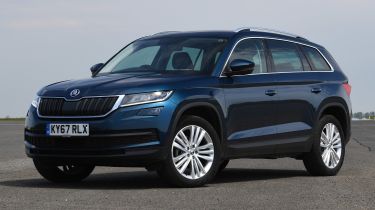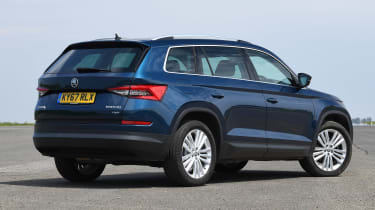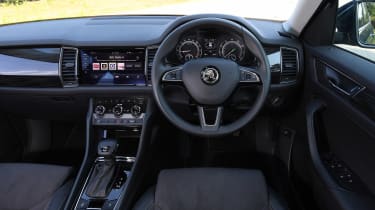Used Skoda Kodiaq (Mk1, 2017-2024) review
A full used buyer’s guide on the Skoda Kodiaq covering the Kodiaq Mk1 (2017-date)
Verdict
Skoda has a habit of producing great cars that put an emphasis on usability and affordability, and while its products used to be bought with the head rather than the heart, that’s no longer necessarily the case. The Kodiaq is proof of this; when it arrived we were so impressed that it scooped Best Large SUV in our 2017 New Car Awards. At the time we proclaimed: “The new Kodiaq offers family-friendly practicality in a more stylish body than a conventional MPV, while features such as the slick infotainment system and all of the brand’s usual ‘Simply Clever’ touches combine with Skoda’s affordable pricing to make the Kodiaq the best large SUV on sale”. A year later the Kodiaq scooped the same award. and today this multi-talented family car remains a desirable model, even as the competition expands and improves.
A long time ago in the UK, Skoda’s products weren’t seen in the best light. But when the company was absorbed into the Volkswagen Group, it moved on to a completely different trajectory.
Skoda had resources at its disposal that were previously just a pipe dream, and as a result its cars rapidly gained much more respect and desirability. The launch of the Kodiaq in 2017 was the ultimate expression of Skoda’s now upmarket position, because this was the Czech brand’s first large seven-seat SUV.
Used - available now

2019 Skoda
Kodiaq
61,763 milesManualPetrol1.5L
Cash £15,200
2019 Skoda
Kodiaq
17,692 milesAutomaticPetrol1.5L
Cash £20,387
2024 Skoda
Kodiaq
24,074 milesAutomaticPetrol2.0L
Cash £31,000
2021 Skoda
Kodiaq
60,010 milesAutomaticPetrol1.5L
Cash £21,549With its smart, chiselled looks, impressive dynamics and tempting value, the Kodiaq summed up everything that Skoda has come to stand for, and indeed confirmed that the brand’s transformation was now complete.
Models covered
- Skoda Kodiaq (2017-2024) - This Skoda SUV is a great family wagon with up to seven seats and lots of practicality.
History
The Kodiaq arrived in April 2017 with 124bhp or 148bhp 1.4 TSI and 178bhp 2.0 TSI petrol engines, or a 2.0 TDI diesel in 114bhp, 148bhp and 187bhp forms. Four-wheel drive was standard with the most powerful engines and optional on the mid-range units.
The Scout arrived in October 2017 and featured seven seats, four-wheel drive, 19-inch wheels and redesigned bumpers. An SE Technology trim came in June 2017 with standard navigation; six months later the SportLine slotted between the SE L and Edition with 20-inch wheels, reprofiled bumpers and sport seats.
In July 2018 a 1.5 TSI engine replaced the 1.4 TSI unit, and the range-topping Laurin & Klement arrived with a heated windscreen, upgraded hi-fi and extra driver aids. The sporty Kodiaq vRS appeared in March 2019, with a 237bhp 2.0-litre twin-turbo diesel.
A facelift in mid-2021 saw the entire range revised and overhauled with a new nose, improved safety systems, upgraded infotainment features and the introduction of a new 2.0-litre petrol engine for the sportier vRS model. The Mk1 Skoda Kodiaq was replaced by the Mk2 Skoda Kodiaq in 2024.
Which one should I buy?
The TSI engines work well (even the 1.4), but the motor that makes the most sense is the 2.0 TDI because it’s muscular and economical – and it’s the most common unit, too.
The manual and auto transmissions are decent and, if you’re buying for towing, we’d recommend four-wheel drive. Entry-level Kodiaq models come with 17-inch alloys, air-con, a multifunction steering wheel, DAB radio, keyless go and touchscreen infotainment.
SE features 18-inch alloys, cruise control, rear parking sensors, automatic lights and wipers, dual-zone climate control and an eight-inch touchscreen display. The SE L adds a powered tailgate, 19-inch wheels, Alcantara trim, LED headlights and heated front seats. The Edition gets leather, metallic paint and extra driver-assistance systems.
Alternatives to the Skoda Kodiaq
If you want to stick with the VW Group, the closest match is the SEAT Tarraco, which is almost interchangeable with the Kodiaq. Alternatively a VW Tiguan or Tiguan Allspace (with five or seven seats respectively) might suit. The second-generation Peugeot 5008 (from 2016) looks great and is comfortable, as well as decent value, while the Nissan X-Trail has an uninspiring interior but is spacious and comes with efficient engines.
The X-Trail can be had with seven seats, just like the Kia Sorento and its cousin, the Hyundai Santa Fe, which are great value and come with excellent warranties. The Land Rover Discovery Sport looks smart and has a strong image but it’s costly; so are the Audi Q5, Volvo XC60, BMW X3 and Mercedes GLC, all of which come with only five seats.
What to look for
Efficiency
To improve economy the 148bhp 1.4 and 1.5 TSI engines have cylinder shut-off tech; this is barely noticeable in operation.
Seats
SE L trim and above come with seven seats as standard; a third row is optional on cheaper editions, but can’t be had at all with the entry-level S.
Automatic
Some owners have found that the seven-speed twin-clutch DSG isn’t quite as slick as the six-speed equivalent, so look out for jerky changes.
Towing
If you’re planning to pull, then check the maximum weights, which vary between 1,775kg and 2,300kg depending on which drivetrain is specified.
Interior
The Kodiaq is pure VW Group inside the cabin. That means a well designed dashboard with clear instrumentation, impressive build quality, plenty of soft-touch materials and a solid weighting to all of the controls. The Kodiaq’s cabin is very roomy, too – and although the third row (where fitted) isn’t suitable for large adults, small grown-ups or teenagers can easily get comfortable. Facelifted models also have the option of massaging seats.
Equally impressive is the boot space, which is pegged at 270 litres with seven seats in place, or 2,005 litres with all rear seats folded. Another plus point of the Kodiaq’s interior is the technology fitted; SE models get an eight-inch touchscreen system with Apple CarPlay and Android Auto as standard, and this is upgraded to a 9.2-inch unit with sat-nav on SE L models.
Running costs
Owners can choose fixed or variable servicing. The former is set at 12 months or 10,000 miles; the latter allows up to two years and 20,000 miles between visits to the garage, depending on how the car is driven.
Services alternate between minor and major at £185 and £289; the former is merely an oil change and an inspection. The major service is a more extensive check, but no extra parts are replaced; a full schedule of what needs to be replaced, and when, is online at skoda.co.uk/ owners. Every four years a new pollen filter and spark plugs (petrol engines) are required at £35 and £105; fresh brake fluid every two years costs £65. Cambelt replacement intervals vary depending on engine, but TDIs need one every 130k/five years - dropping to 74k miles for the VRS.
Recalls
The Skoda Kodiaq has been recalled five times so far in its lifetime, the first occasion being in May 2019 because 236 cars built in December 2018 weren’t fitted with enough nuts to secure the back seat properly.
Two weeks later (also in May), 393 Kodiaqs were recalled because of faulty airbags fitted to cars built in January and February 2018. The third recall in July 2019 affected 238 Kodiaqs built in February 2019. This time the problem centred on the front seats, some of which had been manufactured with cracks in the frame.
Another recall in September 2019 affected 1,231 cars made between October 2018 and June 2019. A software fault meant the engine produced insufficient torque at low revs, so an update was required to mend the problem.
The most recent recall in December 2020 was the result of a possibly insufficient weld connection between the brake pedal and the brake pedal plate. This affected a small number of Kodiaqs built between 14th and 17th July 2020.
Driver Power owner satisfaction
The Kodiaq came a very impressive sixth out of 75 entries in the 2021 Driver Power new car survey, and to show that this wasn’t a fluke it achieved exactly the same result in the 2019 and 2020 polls, too. The Skoda scored top marks for reliability, with a high score for overall value for money, too. Some lower scores were given for economy and high servicing costs, but overall the Kodiaq put in a very impressive performance.










